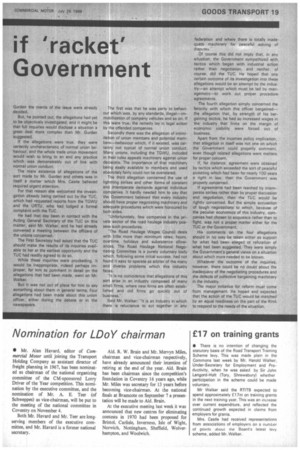if 'racket' Government
Page 21

If you've noticed an error in this article please click here to report it so we can fix it.
Gurden the merits of the issue were already decided.
But, he pointed out, the allegations had yet to be objectively investigated, and it might be that full inquiries would disclose a situation a great deal more complex than Mr. Gurden suggested.
If the allegations were true, they were certainly uncharacteristic of normal union behaviour, and the whole trade union movement would wish to bring to an end any practice Which was demonstrably out of line with normal union conduct.
The mere existence of allegations of the sort made by Mr. Gurden and others was in itself a matter which Mrs. Castle believed required urgent attention.
For that reason she welcomed the investigation already being carried out by the TUC, which had requested reports from the TGWU and the URTU, who had lodged a formal complaint with the TUC.
He had that day been in contact with the Acting General Secretary of the TUC on this matter, said Mr. Walker, and he had already convened a meeting between the officers of the unions concerned.
The First Secretary had asked that the TUC should make the results of its inquiries available to her at the earliest opportunity and the TUC had readily agreed to do so.
While these inquiries were proceeding, it would be inappropriate, indeed perhaps im proper, for him to comment in detail on the allegations that had been made, went on Mr. Walker.
But it was not out of place for him to say something about them in general terms. Four allegations had been made about this union officer, either during the debate or in the newspapers. The first was that he was party to behaviour which was, by any standards, illegal—im
mobilization of company vehicles and so on, If this were true; the remedy lay in legal action by the offended companies.
Secondly there was the allegation of intimidation of union members and potential members—behaviour which, if it existed, was cer tainly not typical of normal union conduct. Many unions, including the TGWU, included in their rules appeals machinery against union decisions. The importance of that machinery being easily available to members and used absolutely fairly could not be overstated.
The third allegation concerned the use of lightning strikes and other forms of constant and intemperate demands against individual companies. It hardly needed him to say that the Government believed that every industry should have proper negotiating machinery and adequate procedures which were honoured by both sides.
"Unfortunately, few companies in the private sector of the road haulage industry possess such procedures.
"The Road Haulage Wages Council deals with little more than minimum rates, hours, overtime, holidays and subsistence allow ances. The Road Haulage National Negotiating Committee is a purely voluntary body which, following some initial success, had not found it easy to operate as arbiter of the many and diverse problems which this industry faces.
"It is no coincidence that allegations of this sort arise in an industry composed of many small firms, where new firms are often established and old firms go quickly out of business."
Said Mr. Walker: "It is an industry in which there is reluctance to act together in any federation and where there is totally inadequate machinery for peaceful solving of disputes."
Of course this did not imply that, in any situation, the Government sympathized with tactics which began with industrial action rather than negotiation, and neither, of course, did the TUC. He hoped that one certain outcome of its investigation into these allegations would be an attempt by the industry—an attempt which must be led by management—to work out proper procedure agreements.
The fourth allegation simply concerned the ferocity with which this officer bargained- the allegation that, by strength of his bargaining tactics, he had so increased wages in the industry that firms on the margin of economic viability were forced out of business.
Apart from the incomes policy implication, that allegation in itself was not one on which the Government could properly comment, even though related allegations were matters for proper concern.
If, for instance, agreement were obtained by tactics which exceeded the sort of peaceful picketing which had been for nearly 100 years a right in law, then the Government was properly concerned.
If agreements had been reached by intemperate strikes rather than by proper discussion and negotiation, then the TUC would be rightly concerned. But the simple accusation of tough negotiations to which, because of the peculiar economics of this industry, companies had chosen to acquiesce rather than to fight, was not a proper matter either for the TUC or the Government.
His comments on the four allegations should in no way be taken either as support for what had been alleged or refutation of what had been suggested. They were simply the Government's general views on a situation about which more needed to be known.
Whatever the outcome of the inquiries, however, there could be no doubt about the inadequacy of the negotiating procedures and the defects of collective bargaining machinery in the industry.
The major initiative for reform must come from management. He hoped and expected that the action of the TUC would be matched by an equal readiness on the part of the R HA to respond to the needs of the situation,
















































































































